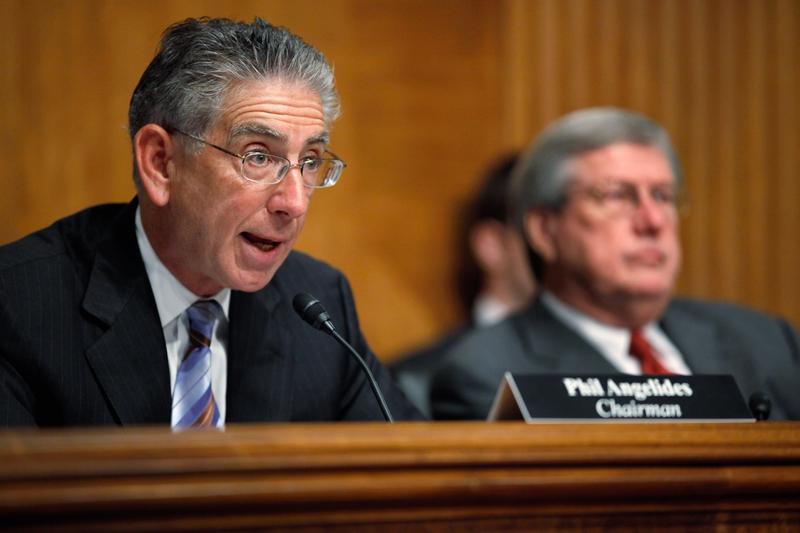
Welcome to Politics Bites, where every afternoon at It's A Free Country, we bring you the unmissable quotes from the morning's political conversations on WNYC. Today on The Brian Lehrer Show, is the second in a four-part series with Phil Angelides. This week he continues to unpack the commission's findings, taking a look at the ongoing fallout of the economic meltdown.
The report of the commission is, as of today, officially a New York Times best seller: nonfiction book #10. The book sells for $14.99, with royalties going to the government. Angelides thought that while that revenue is positive, it won’t help the economy much.
As you and I know, the devastation from this financial crisis… is in the trillions of dollars, so we’ll be digging out for quite some time from the mishaps and misjudgments that led our financial system to the precipice of collapse.
Angelides pointed to a clear divergence in the impact of the crisis on large banks versus small and medium size banks. While the large banks recovered and are profiting, since January of 2009, 297 small and medium-sized banks have failed, and the number of smaller banks on the FDIC’s list of troubled institutions rose to 860 by the third quarter.
So you have this dichotomy where the large banks having been saved, have significant profits — and I might add that banks that have assets of a billion dollars or more are the most profitable — and you have small banks failing around the country.
Many of these small banks made loans in real estate, and while they did not engage in the disastrous subprime lending that precipitated the crisis, when the real estate market crashed and unemployment rose, many of the holders of even traditional low-risk mortgages found themselves underwater or unable to pay.
Clearly [this] had a tremendous impact on smaller community banks. And I think part of the phenomenon we’re also seeing in the financial sector is more and more concentration of power and money in fewer and fewer money-centered banks on this country than we had, even before the crisis, making them even more too big to fail.
From 1990 to 2005, the top ten banks in this country went from controlling 25 percent of banking assets to controlling 55 percent.
Since the crash, I believe that the largest set of banks now have over 60 percent of the assets. We are now in a situation where there are fewer too-big-to-fail institutions.
Angelides said the current second wave of foreclosures can be blamed on continued high unemployment and the complexity of the mortgage lending system.
The continuing foreclosures and the inability to modify mortgages is helping to keep housing prices down and keeping the housing market very unstable. The combination of continued unemployment, continued foreclosures, and the very difficult problems facing homeowners who want to get their mortgages modified… is keeping the foreclosure crisis right in front of us and is a big drag on the economy.
Angelides said that while during the course of inquiry he refrained from giving opinions, now that he can speak frankly, he feels strongly that aggressive steps are required to help home owners stay in their homes and stand up against the complex and difficult systems of mortgage trading that the banks have constructed.
I believe we need to be much more aggressive in trying to help people who can make a level of payments stay in their homes…We have created a tangled web and I believe we need much more forceful action.
Angelides weighed in on the question of whether states like California should be allowed to declare bankruptcy with a heavy sigh.
I don’t know that that’s a wise move. It’s a very wealthy state, the state ought to be able to balance it’s budget. We’ve had twenty years now of political leaders promising everything and reducing taxes, and I think what we’ve got to do is balance our budget and provide a level of service that people want and level with people. I think the bankruptcy route would be very damaging.
Before concluding, Angelides encouraged everyone to read the full report.
This is an important story of what happened in this country, how we came to the verge of financial collapse, and hopefully there will be lessons learned here so we do not repeat this.